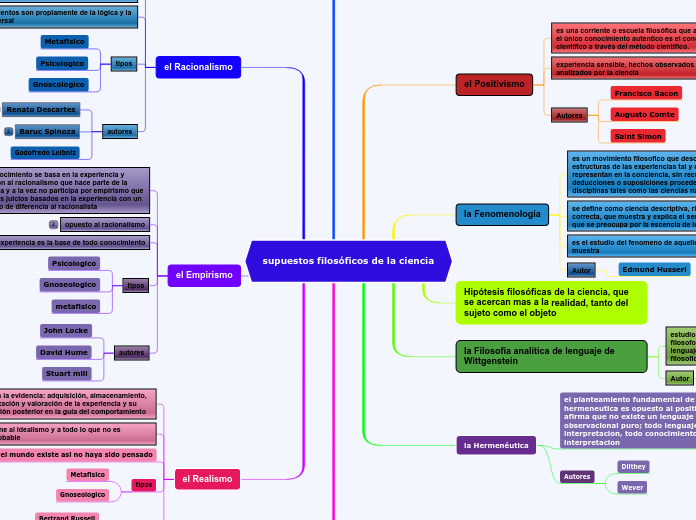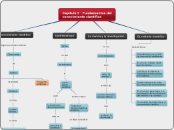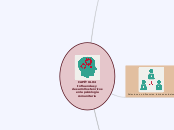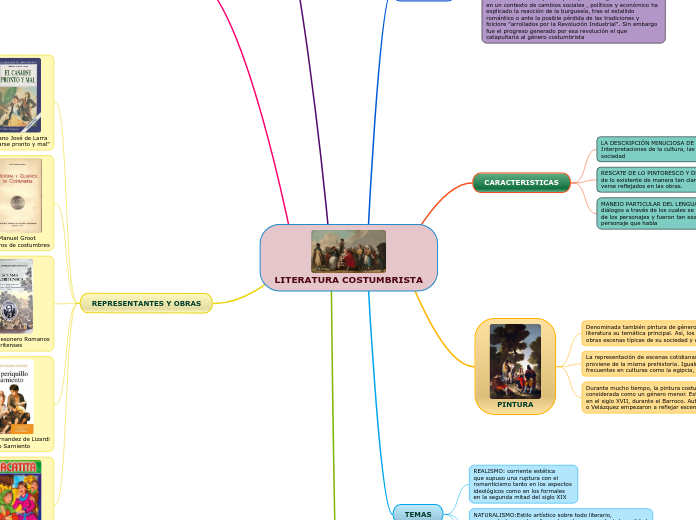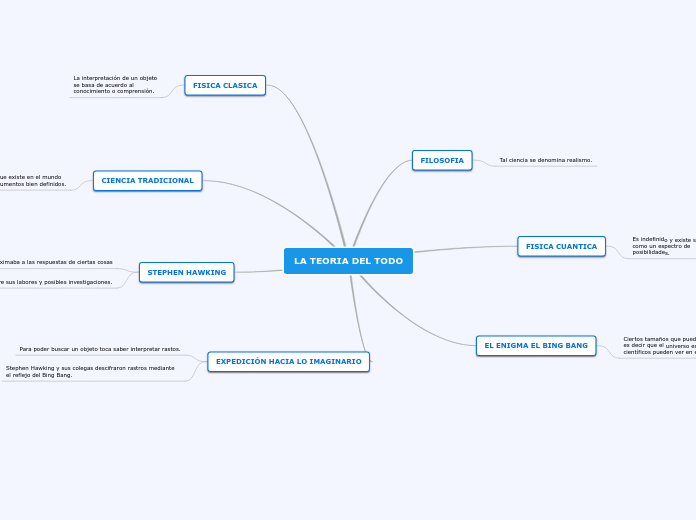supuestos filosóficos de la ciencia
The part of speech is a category to which a word is assigned according to its syntactic functions. In English the main parts of speech are noun, pronoun, adjective, determiner, verb, adverb, preposition, conjunction, and interjection.
el Idealismo
Immanuel Kant
el centro es la conciencia a las ideas y no existe objeto si la mente no es conciente de que existe
la realidad que esta fuera de su propia mente no es comprensible
Domina el sujeto sobre la evidencia o sobre la teoría; para convertir la evidencia en imágenes, sensaciones y emociones como los mas importantes contenidos de la conciencia, para reforzar o reconstruir teorías o conocimientos que ya se poseen.
el Realismo
A conjunction is a word like 'if' 'but' or 'and' which is used to connect sentences or clauses together.
Mario Bunge
George Moore
Bertrand Russell
el mundo existe asi no haya sido pensado
se opone al idealismo y a todo lo que no es comprobable
Subordinating conjunctions are conjunctions that are used at the beginning of subordinate clauses. Some examples of these conjunctions are: although, after, before, because, how, if, once, since, so that, until, unless, when etc.
Although it was raining, I went out.
domina la evidencia: adquisición, almacenamiento, organización y valoración de la experiencia y su utilización posterior en la guía del comportamiento
Coordinating conjunctions always connect phrases, words, and clauses. They are: for, and, nor, but, or, yet, so.
This stew is savory and delicious.
el Empirismo
A preposition is one of the most exciting parts of grammar. A preposition is used to describe the location of something in relation to something else.
A group of words used with the force of a single preposition is called phrase preposition.
Stuart mill
David Hume
John Locke
Participle preposition consists of words that end in “ing”.
metafisico
Gnoseologico
la experiencia es la base de todo conocimiento
When a preposition consists of more than one word, it is called double preposition.
into, within, upto etc.
opuesto al racionalismo
Compound preposition consists of two or more words.
on behalf of, according to, in front of, from across, etc.
todo conocimiento se basa en la experiencia y afirmación al racionalismo que hace parte de la metafísica y a la vez no participa por empirismo que acepta los juicios basados en la experiencia con un contenido de diferencia al racionalista
When a preposition consists of one word it is called single or simple preposition.
in, at, on, to for, of, from, up, after, over, under, with, etc.
el Racionalismo
An adverb is used to describe a verb, but it can also describe an adjective or another adverb.
Adverbs normally help paint a fuller picture by describing how something happens.
The intensifiers strengthen adverbs adjectives and adverbs and down- toners make them weaker.
Godofredo Leibniz
Baruc Spinoza
Fairly, Rather
Renato Descartes
Extremely, Very
Gnoscologico
Psicologico
Metafisico
los conocimientos son propiamente de la lógica y la validez universal
Always, usually, Never
Es posible conocer la realidad mediante el pensamiento puro, sin necesidad de ninguna premisa empírica
Carefully, Slowly
el Materialismo
A numeral is a word or phrase that describes a numerical quantity.
Some theories of grammar use the word 'numeral' to refer to cardinal numbers that act as a determiner to specify the quantity of a noun, for example the 'two' in 'two hats'.
autores
*Democrito
*Epicoro
*Max
*Engels
tipos
*Dialectico
*histórico
*filosófico
*científico
todo lo que existe es materia
One, two..
es la materia que tiene existencia con independencia de ser pensada, el pensamiento y los fenómenos mentales se desarrollan a partir de conceptos que conllevan un dialecto empírico hacia las ciencias naturales
First, second..
la Hermenéutica
Wever
Dilthey
el planteamiento fundamental de la hermeneutica es opuesto al positivismos. afirma que no existe un lenguaje observacional puro; todo lenguaje es interpretacion, todo conocimiento es interpretacion
según esta corriente, es la teorización el interés en datos cualitativos, el rechazo a lo cuantitativo el manejo critico del lenguaje y la diferencia importante en las ciencias naturales y las ciencias sociales
la Filosofía analítica de lenguaje de Wittgenstein
An article is a word used to modify a noun, which is a person, place, object, or idea. Technically, an article is an adjective, which is any word that modifies a noun.
Indefinite articles are the words 'a' and 'an.' Each of these articles is used to refer to a noun, but the noun being referred to is not a specific person, place, object, or idea. It can be any noun from a group of nouns.
Ludwing Wittgenstein
estudio el lenguaje vinculado con la logica, los filosofos analiticos pensaban que estudiando el lenguaje se resolveria todos los problemas filosoficos.
It refers directly to a specific noun or groups of nouns.
The breakfast on my plate.
Hipótesis filosóficas de la ciencia, que se acercan mas a la realidad, tanto del sujeto como el objeto
An adjective is a word that's used to describe a specific noun and to provide more detail to the listener.
la Fenomenología
A noun is defined as a person, place, thing or idea. Proper nouns always begin with a capital letter. Common nouns, which are general words, such as 'cars,' are not capitalized.
Autor
Compound nouns are words where two nouns have been stuck together to make a new noun. Compound nouns should be written as one word, without a hyphen.
Edmund Husserl
es el estudio del fenomeno de aquello que se muestra
A noun which refers to a group of things/people.
Family, Class
se define como ciencia descriptiva, rigurosa, correcta, que muestra y explica el ser en si mismo que se preocupa por la escencia de lo vivido
Countable nouns are nouns that can be counted, even if the number might be extraordinarily high.
Uncountable nouns are nouns that come in a state or quantity which is impossible to count; liquids are uncountable, as are things which act
like liquids.
Cats, Rain
es un movimiento filosofico que describe las estructuras de las experiencias tal y como se representan en la conciencia, sin recurrir a teorias deducciones o suposiciones procedentes de otras disciplinas tales como las ciencias naturales
Proper nouns are the names of specific people or places. They should always begin with a capital letter.
Mary, Paris
el Positivismo
A verb is an action word or 'doing' word that signifies movement in some way.
Autores
A modal is a type of auxiliary (helping) verb that is used to express: ability, possibility, permission or obligation. The main modal verbs in the English language are: can, could, may, might, must, shall, should, will, would.
Saint Simon
Augusto Comte
Francisco Bacon
experiencia sensible, hechos observados y analizados por la ciencia
A linking verb connects the subject with a word that gives information about the subject, such as a condition or relationship.
You look exhausted after studying all night.
es una corriente o escuela filosófica que afirma que el único conocimiento autentico es el conocimiento científico a través del método científico.
A verb with its own meaning: a verb that is not an auxiliary verb.
Create sentences
They have it.
